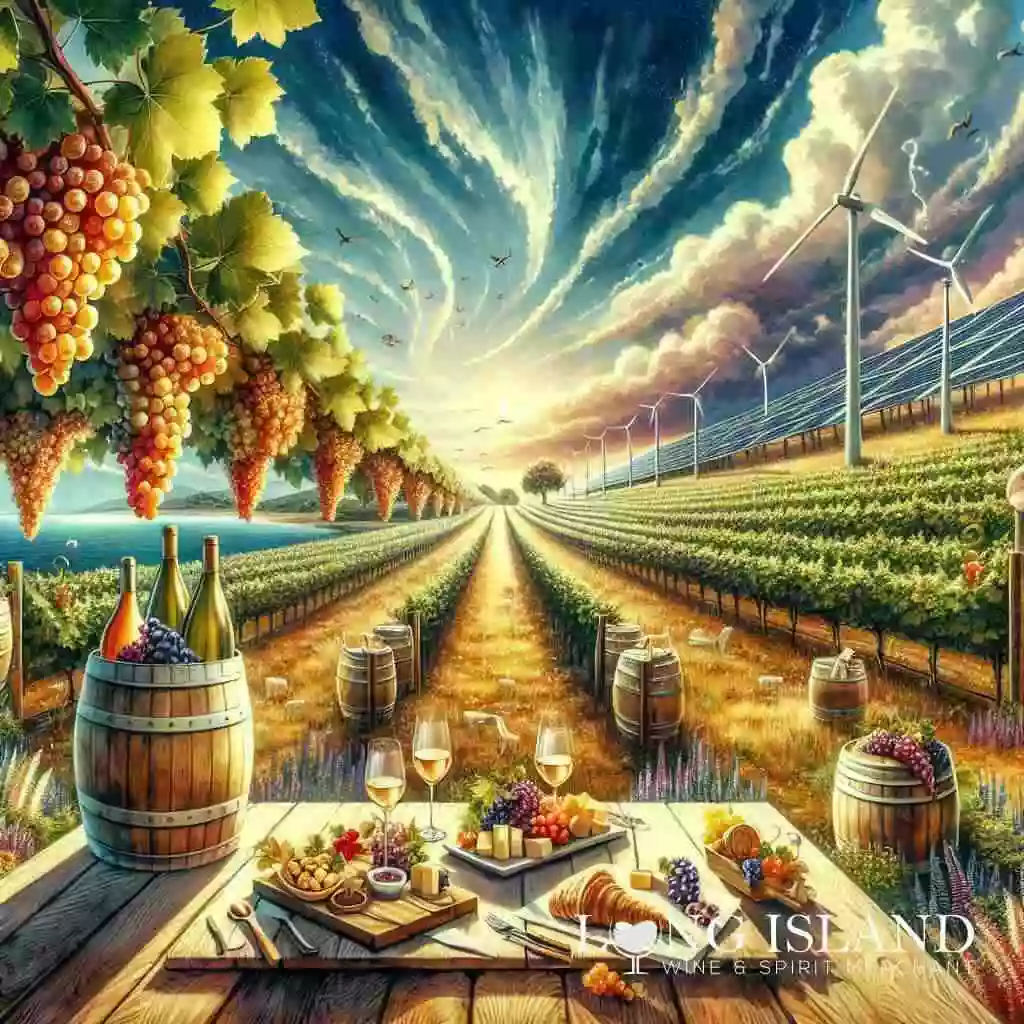
Explore the Difference Between Organic vs. Conventional Spirits
April 21, 2025
Introduction: Unveiling the Spirit Spectrum
Understanding the Rise of Organic Spirits
In recent years, the buzz around organic spirits has been echoing across the vast landscapes of the alcohol industry. The emergence of organic liquor signifies a shift in consumer preference, emphasizing health-conscious choices and sustainable practices. As drinkers become increasingly aware of the environmental impact of alcohol, they gravitate towards eco-friendly options. This trend is part of a broader movement favoring sustainable agriculture in spirits. By prioritizing organic farming methods and pesticide-free production, the spirits industry is not only redefining taste but also its relationship with the planet.
The Conventional Path: Tried and True Methods
Contrary to the organic movement, conventional spirits production relies on historically tested methods that have stood the test of time. Traditional alcohol production methods often employ non-organic ingredients, embracing synthetic fertilizers and pesticides to maintain high yields. This approach, while efficient, sometimes stands in contrast to the purity sought by modern consumers. Trusted methods yield robust flavor profiles and characterize the traditional spirits landscape. Nonetheless, it is critical to weigh these flavors against the sustainable alcohol practices that are increasingly capturing consumer interest.
Demystifying Spirit Classification
Classifying spirits involves understanding both the ingredients and the methods by which they are produced. The intricate world of distilled spirits includes a variety of categories distinguished by the source of materials-be it organic or conventional-and distillation techniques. Traditional spirits are often celebrated for their rich taste profiles, while organic varieties offer a cleaner, more refined palette. As modern consumers become more informed, the demand for transparency in alcohol production has increased. By understanding these classifications, consumers can make informed choices that align with their preferences and ethical considerations.
Organic Origins: From Farm to Flask
The Roots: Organic Farming in Spirits
Organic farming represents the foundation of what we now regard as premium organic spirits selections. This approach prioritizes natural processes, eschewing synthetic fertilizers and pesticides in favor of biodiversity and ecological balance. By cultivating grains, fruits, and botanicals in a manner that aligns with sustainable agriculture in spirits, organic farmers not only ensure the integrity of their crops but also contribute to the preservation of our planet. These practices result in ingredients that are as robust in flavor as they are sustainable. By embracing such methods, the spirits industry is paving a path towards a more conscientious, eco-friendly future.
Harvesting Purity: Natural Ingredients in Liquor
The journey from farm to flask involves a careful selection of natural ingredients that embody purity and quality. Organic spirits rely on pesticide-free grapes, wheat, barley, and other prime materials. This commitment to purity not only caters to health-conscious consumers but also elevates the overall taste experience. Liquor crafted from natural ingredients often boasts a complexity that is both genuine and nuanced, showcasing the depth achievable when nature takes the lead. Such meticulously curated components are what make organic liquor a preferred choice for those seeking authenticity in their alcoholic beverages.
Sustainable Distilling: Eco-Friendly Practices
In tandem with organic farming, sustainable distillation techniques are crucial to producing spirits that respect both taste and the environment. These techniques involve utilizing energy-efficient technologies and reducing water waste, ensuring minimal ecological disruption. The distillation process, a hallmark of spirit production, becomes a stage for innovation as producers strive to balance tradition with ecological mindfulness. The shift towards eco-conscious spirits production demonstrates a commitment to reducing the overall environmental impact of alcohol. By integrating these eco-friendly practices, the spirits industry not only enhances its products but also fosters a culture of sustainability that resonates with modern consumers.
The Conventional Chronicles: Tradition Meets Taste
The Legacy: Traditional Spirits Production Methods
Conventional spirits owe much of their identity to age-old alcohol production methods that have been refined over centuries. These methods prioritize consistency and efficiency, embracing the use of modern agricultural technologies such as synthetic fertilizers and pesticides to ensure robust crop yields. Traditional distillation methods, often passed down through generations, are celebrated for creating beloved taste profiles that captivate audiences worldwide. Yet, as the world pivots towards sustainability, these practices are reconsidered in the context of contemporary values and environmental concerns. The juxtaposition of tradition and innovation creates a dynamic space where old meets new, inviting fans of traditional spirits to appreciate both the enduring charm of established techniques and the evolving discourse on sustainability.
Chemical Concoctions: Non-Organic Ingredients
A defining element of conventional spirits is their reliance on non-organic ingredients. This reliance often involves agricultural inputs like synthetic fertilizers and pesticides, securing high-quality yields that meet industry demands. These components play a critical role in flavor development and preservation, ensuring that each bottle delivers the consistent experience consumers expect. However, the use of these chemical aids raises questions about the long-term impact on both health and the environment. As clean label liquor production gains traction, the spirits sector faces increased scrutiny over ingredient transparency. Consumers are becoming more informed and selective, leaning towards spirits that clearly disclose production practices and ingredient sourcing. Therefore, understanding the balance between flavor enhancements and potential health implications becomes increasingly important for those navigating the intricate world of conventional spirits.
Flavor Profiles: Comparing Distillation Techniques
The distillation process is at the heart of spirit production, defining the final product’s taste and aroma. Traditional techniques, with roots tracing back through history, are known for creating rich and robust taste profiles of spirits. These processes meticulously craft spirits that offer deep and complex flavors, cherished by enthusiasts and connoisseurs alike. By contrast, organic spirits tend to offer a cleaner, more subtle palette that speaks to their use of pure ingredients and minimal intervention methods. Comparing the flavor profiles between conventional and organic spirits allows consumers to appreciate the nuances that each method brings to the table. This exploration encourages a deeper appreciation for both the artistry of traditional distillation and the purity of organic production, cultivating a new era of empowered, informed spirit selection.
For those interested in the local scene, there are opportunities for finding spirits near Commack, where traditional and innovative methods converge, offering a unique insight into the evolving landscape of spirit production.
Sipping Sustainably: The Environmental Impact
Eco-Conscious Distillation: Minimizing Footprints
As the spirits industry evolves, eco-conscious distillation stands at the forefront of sustainable alcohol production. By embracing energy-efficient technologies and minimizing resource consumption, distillers significantly lessen the environmental impact of alcohol. These techniques not only conserve water and energy but also reduce emissions, ensuring a more sustainable future. Additionally, implementing waste-reduction initiatives and recycling programs further showcases the industry’s commitment to preserving the planet. This mindful approach appeals to modern consumers who prioritize eco-friendly practices, enhancing brand reputation and market reach. By choosing eco-conscious spirits production, companies not only contribute to environmental preservation but also align with consumer values, bridging the gap between tradition and innovation.
Pesticide-Free Alcohol: Health Benefits and Beyond
The demand for pesticide-free alcohol reflects an increasing consumer awareness of health and sustainability. Organic spirits, crafted from natural ingredients without synthetic additives, offer numerous health benefits over conventional alternatives. This purity reduces exposure to harmful chemicals, catering to those seeking chemical-free spirits. Additionally, pesticide-free production supports biodiversity and soil health, contributing to ecosystem balance. The emphasis on natural farming practices aligns with sustainable agriculture, fostering a cycle of responsibility towards nature. For consumers, the shift towards pesticide-free products signals a growing preference for health-conscious options that do not compromise on sustainable agricultural practices.
Transparent Production: Clean Label Spirits
Transparency in production has become a critical component of the spirits industry, prompting a shift towards clean label liquor. Consumers desire insights into ingredient sourcing, production methods, and ecological impacts. As a result, brands are adopting transparent practices to meet this demand, ensuring that product labels reflect authentic and ethical manufacturing processes. The rise of clean label spirits responds to consumer calls for honesty in the industry, enhancing trust and loyalty. This movement not only promotes clarity in ingredient disclosure but also supports environmentally friendly practices, creating a conduit for informed choices. By embracing clean label liquor production, the industry aligns itself with modern transparency trends, paving the way for a future where authenticity and integrity define the consumer experience.
Tasting Trends: Navigating Consumer Preferences
The Rise of Organic Beverage Trends
In recent years, a surge in organic beverage trends in New York has transformed the way consumers perceive spirits. With increasing awareness about health and sustainability, these trends emphasize purity and eco-conscious choices. More individuals are opting for organic liquor due to its natural ingredients and minimal environmental impact, reflecting a broader, conscientious consumer movement. This shift is not just limited to niche markets but is becoming a mainstream preference that influences the portfolio of offerings from well-established online liquor stores. Retailers, including Order Alcohol Online, adapt by expanding their selections to include more organic-friendly options for those eager to make health-conscious decisions without compromising quality.
Quality Quests: Evaluating Organic Spirits
Evaluating organic spirits involves a nuanced exploration of quality, origin, and craftsmanship. Consumers are increasingly embarking on quality quests, scrutinizing the meticulous production processes that define certified organic liquor. These spirits are often characterized by their authentic flavor profiles and refined taste, achieved through sustainable and pesticide-free agricultural practices. Enthusiasts and novices alike are diving into the world of premium organic spirits selections, seeking offerings that stand out not only in quality but also in ethical production. The demand for authenticity is not merely a trend but a testament to shifting priorities towards sustainable consumption and ethical engagement.
From Labels to Liquor: Transparency’s Role in Choice
Transparency plays a pivotal role in the decision-making process of modern consumers, who demand details about ingredient sourcing and production practices. The call for clean label spirits highlights a significant trend where buyers seek clarity to ensure that what they consume aligns with their values. As a result, brands are moving towards more open labeling practices, providing in-depth insights into every stage of production. This transparency enhances consumer trust and loyalty, making transparency in alcohol production a key marketing and ethical strategy in the spirits industry. By aligning with transparency trends, retailers and producers foster informed choices, bridging the gap between consumer expectations and spirit integrity. Exploring spirits with transparent labels empowers consumers, offering a clearer understanding and deeper connection to the products they choose to enjoy.
Conclusion: To Sip or Not to Sip Organic
Weighing the Benefits: Flavor vs. Sustainability
In the debate between organic and conventional spirits, many factors come into play. Organic spirits boast a cleaner taste profile, achieved through natural spirits production and free of synthetic additives. This purity appeals to those prioritizing health and environmental ethos, offering a delightful experience without compromising on sustainable agricultural practices. On the other hand, conventional spirits deliver a robust flavor born from traditional alcohol production methods that have been perfected over time. Each method presents its own set of advantages, leaving consumers with a choice that speaks to their personal values concerning taste, purity, and sustainability. As the alcohol market diversifies, those interested in a holistic approach may find joy in exploring craft spirits, which blend elements from both worlds, thus offering a balanced sipping experience that caters to the conscience and the palate.
The Future of Spirits: A Toast to Innovation
Looking ahead, the spirits industry is on the brink of transformation as it embraces innovation while honoring tradition. The rise of premium organic spirits selections illustrates a shift towards sustainable practices, aligning with the growing demand for eco-friendly products. As these trends continue to flourish, enhanced transparency and clean label liquor production will play a pivotal role in shaping consumer preferences. Meanwhile, technological advancements in distillation and ingredient sourcing promise to redefine what we know about flavor and quality in both organic and conventional offerings. At the heart of these innovations lies the promise of a diverse and responsible market. As shoppers explore vibrant options at platforms like Order Alcohol Online, they partake in a journey that celebrates both innovation and tradition, ensuring that every sip tells a story of heritage and progress.
Frequently Asked Questions
Question: What are the benefits of choosing organic spirits from Order Alcohol Online?
Answer: Choosing organic spirits from Order Alcohol Online comes with several benefits. Organic spirits are crafted using natural ingredients in spirits, which are free from synthetic additives and pesticides. This results in a cleaner taste, which appeals to health-conscious consumers. Additionally, our spirits are part of sustainable agricultural practices, minimizing the environmental impact of alcohol production. See more on Eco-conscious spirits production. By opting for organic spirits, you can enjoy the rich flavor profiles while supporting eco-friendly alcohol and sustainable distilling practices.
Question: How does Order Alcohol Online ensure transparency in spirit production?
Answer: At Order Alcohol Online, we prioritize transparency in spirit production to meet the expectations of today’s informed consumers. Each spirit we offer comes with detailed information about its ingredient sourcing and production methods. This commitment to clean-label spirits ensures that you know exactly what goes into your beverage, allowing you to make informed decisions in line with your preferences for organic beverage trends or traditional spirits production.
Question: Can you explain the difference between organic spirits and conventional spirits as highlighted in your blog “Explore the Difference Between Organic vs. Conventional Spirits”?
Answer: Our blog “Explore the Difference Between Organic vs. Conventional Spirits” outlines the distinct differences between these two types. Organic spirits are made using natural, pesticide-free ingredients, which contributes to a pure taste profile and aligns with sustainable distilling practices. Conventional spirits, on the other hand, often use non-organic ingredients and traditional spirits production methods, which can result in robust flavors enhanced by chemical aids. For those interested in either type, Order Alcohol Online provides a range that caters to both preferences, ensuring quality and authenticity.
Question: How can I be assured of the quality of organic spirits when ordering online?
Answer: Quality assurance is a top priority at Order Alcohol Online, especially for our premium organic spirits selections. We source certified organic liquor that adheres to stringent organic certification standards. This guarantees that the spirits you receive are not only crafted with organic ingredients in liquor but also comply with high-quality production guidelines. Customers can shop with confidence knowing each bottle represents a commitment to quality and sustainability.
Question: Does Order Alcohol Online provide options for those interested in sustainable distilling and eco-conscious spirits production?
Answer: Yes, Order Alcohol Online offers a curated selection of spirits that focus on sustainable distilling and eco-conscious spirits production. Our collection includes certified organic liquor and chemical-free spirits, reflecting our dedication to reducing the environmental impact of spirits production. We support brands that engage in responsible practices and provide our customers with choices that align with their values, whether they are looking for organic spirits or traditional methods with a sustainable twist.




